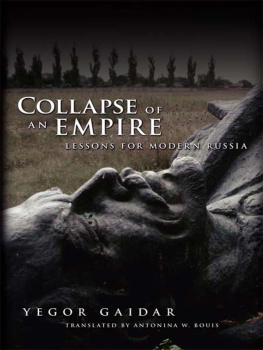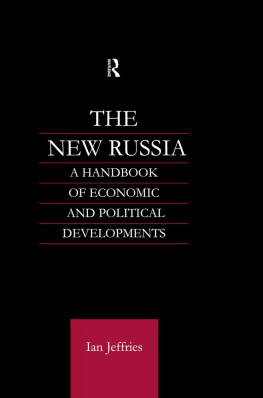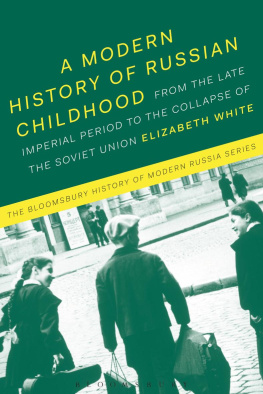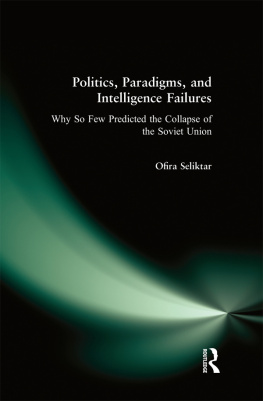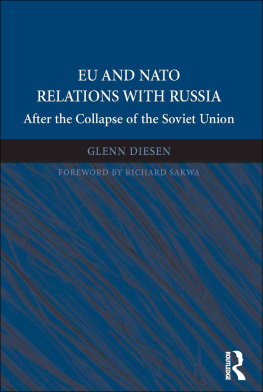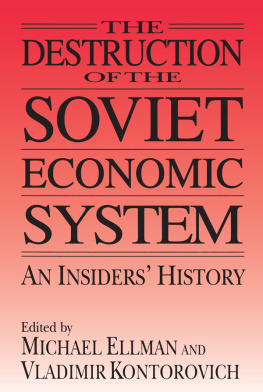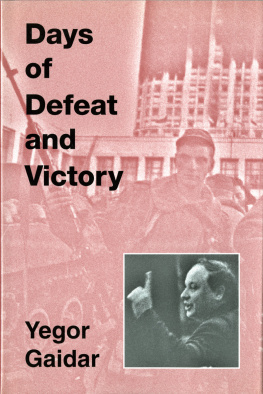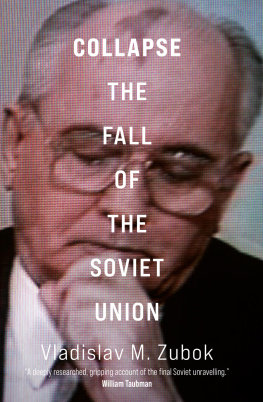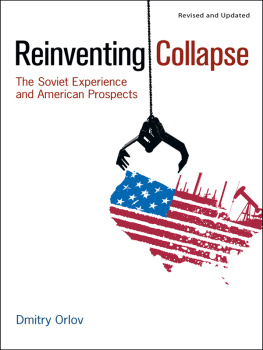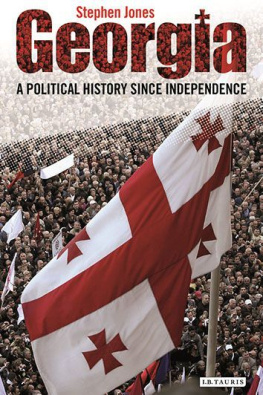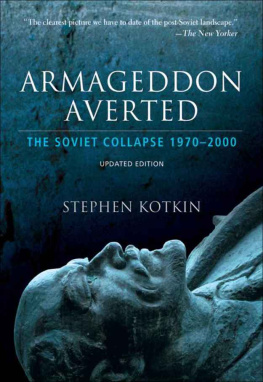COLLAPSE OF AN EMPIRE
LESSONS FOR MODERN RUSSIA
YEGOR GAIDAR
TRANSLATED BY ANTONINA W. BOUIS
B ROOKINGS I NSTITUTION P RESS
W ASHINGTON, D.C.
ABOUT BROOKINGS
The Brookings Institution is a private nonprofit organization devoted to research, education, and publication on important issues of domestic and foreign policy. Its principal purpose is to bring the highest quality independent research and analysis to bear on current and emerging policy problems. Interpretations or conclusions in Brookings publications should be understood to be solely those of the authors.
Copyright 2007
THE BROOKINGS INSTITUTION
1775 Massachusetts Avenue, N.W., Washington, D.C. 20036
www.brookings.edu
All rights reserved. No part of this publication may be reproduced or transmitted in any form or by any means without permission in writing from the Brookings Institution Press.
This work, licensed by Yegor Gaidar, Institute for the Economy in Transition, 2006, was originally published in Russia in 2006 as Gibel imperii. Uroki dlya sovremennoy Rossii
[The Downfall of an Empire: Lessons for Contemporary Russia]
Library of Congress Cataloging-in-Publication data
Gaidar, E. T. (Egor Timurovich)
[Gibel imperii: uroki dlia sovremennoi Rossii. English]
Collapse of an empire: lessons for modern Russia / Yegor Gaidar; translated by Antonina W. Bouis.
p. cm.
Includes bibliographical references and index.
ISBN: 978-0-8157-3115-3
1. Russia (Federation)Politics and government19912. AuthoritarianismRussia (Federation) 3. Soviet UnionPolitics and government19851991. I. Title.
DK510.763.G34913 2007
947.085dc22
2007033505
CONTENTS
ACKNOWLEDGMENTS
Brookings Institution Press acknowledges the generous gift of Daniel Yergin, chairman of Cambridge Energy Research Associates and a trustee of the Brookings Institution, to help cover the costs of this translation.
We also thank Brookings senior fellow Clifford G. Gaddy for his helpful advice and Antonina W. Bouis for her excellent work in translating the Russian text and assisting throughout the page proof stage. Janet Mowery provided outstanding support as she edited the manuscript. Carlotta Ribar also made valuable contributions through proofreading, and Mary Mortensen has pulled together a useful index.
We dont have the strength for an empire!and we dont need it, may it fall from our shoulders: it weakens our brains and sucks them out, and hastens our death.
Aleksandr Solzhenitsyn
If it befalls you to be born in an empire, it is best to live in a distant province by the sea.
Joseph Brodsky
WE ARE NOT THE FIRST to suffer post-empire nostalgia, which permeates the Russian consciousness today. It has occurred in history more than once. The Soviet Union was not the first empire to collapse in the twentieth century, but it was the last. Not a single state formation that called itself an empire at the start of the twentieth century remains. In a number of key characteristics our country did not resemble the traditional colonial empire with overseas territories. The argument over whether it was in fact an empire will continue for a long time. There will be works proving Russia was an empire, demonstrating that the Russian people, under both the tsars and the Communist regime, in many ways supported the other peoples inhabiting our state. There will be examples given of Russian state figures of non-Russian ethnic descentfrom Prince Bagration to Joseph Stalin. That specificity may have helped the Russian empire last longer than others that fell apart decades earlier.
However, the elite of the tsarist period regarded their country as an empire. They called it that. The leaders of the Soviet empire did not use the term, but they expanded it far beyond the official borders of the state called the USSR. Todays proponents of the restoration of the empire appeal to the legacy of tsarist Russia through the period of Soviet history to the present time.
The examples of appeals to post-imperial nostalgia in contemporary Russia are numerous. Let me cite just a few. A political analyst close to the
The age of empires is in the past, but their study is fashionable now. This happens in history. It is related to the acuteness of ethnic conflicts and their spread in post-imperial periods. The literature devoted to the death of empires is boundless. Montesquieus Considerations on the Causes of the Grandeur and Decadence of the Romans and Edward Gibbons six-volume history of the rise and fall of the Roman Empire reveal that the plots relating to the collapse of empires and the post-imperial syndrome are not new. A great book showing traces of post-imperial nostalgia appeared in Spain in the early seventeenth century. It is Don Quixote by Cervantes.
Knowing that others suffered from the same disease is small consolation. That happened long ago and to others. What is happening to us is the reality of today.
When Peter I took the title Emperor of All Russia, he was merely declaring that Russia was a great European state. Grandeur and empire at that time were synonymous. If you consider how often the word empire is used today in political discourse, it is difficult to understand why there is no generally accepted definition commensurate with the contemporary context. The Dal dictionary defines empire as a state whose head bears the title emperor, the highest rank for unlimited rulers. has been transformed through history. I would like to offer my own definition of the concept that is close to todays context. In this work I use empire to mean a powerful multiethnic state formation in which the power (or at the least the right to vote) is concentrated in the metropolis and in democratic institutions (if they exist), though that power and those institutions do not extend to the entire territory under its control.
The twentieth century saw a vivid manifestation of the variety of problems faced by two types of empires: overseas (Britain, Holland, Portugal) and territorially integrated (Austria-Hungary, Russia). In the latter, the colonies are not separated from the metropolis by seas. The ethnic groups that dominate in the metropolis and satellite territories live side by side and interact closely.
As history has shown, especially the experience of the second half of the twentieth century, empires fall apart. The identification of state grandeur with being an empire makes the adaptation to the loss of status of superpower a difficult task for the national consciousness of the former metropolis. The exploitation of the post-imperial syndrome is an effective way of obtaining political support. The concept of empire as a powerful state that dominates other nations is an easy-sell product, like Coca-Cola or Pampers. It does not take intellectual effort to advertise it.
The problem for a country dealing with post-imperial syndrome is that it is easy to evoke feelings of nostalgia for the lost empire. The calls for its restoration are not practicable. It is not hard to say: The restoration of the empire is good for the people. Such a slogan is inevitably popular. But the reality is that an empire cannot be revived.
There is one unique case: the restoration of the Russian empire in different, Communist, almost unrecognizable form in the period 191721. This is an exception, and the whole point is that it was in a different form , which would cause a strict analyst to use restoration only in quotation marks. The USSR arose as a result of a fratricidal civil war, unprecedented terror, and the death of millions of people. In the great majority of cases the restoration of empires is impossible, in view of circumstances formed by long-standing tendencies in socioeconomic development.

